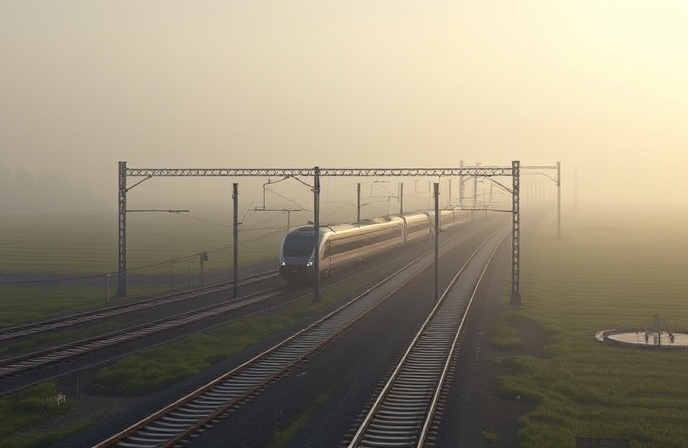Green Rail Revolution: Wabtec & KTZ’s $600M Partnership

Green Revolution on the Rails: Wabtec and KTZ’s Sustainable Rail Transformation
This article explores the groundbreaking memorandum of understanding (MoU) between Wabtec Corporation, a leading global provider of equipment and services for the rail industry, and Kazakhstan Temir Zholy (KTZ), Kazakhstan’s national railway company. This significant $600 million agreement marks a pivotal step towards sustainable rail operations in the Commonwealth of Independent States (CIS) region. The partnership centers on the deployment of cutting-edge battery-electric shunters and the conversion of mainline locomotives to liquefied natural gas (LNG) propulsion. This initiative promises not only substantial environmental benefits through reduced greenhouse gas emissions but also significant cost savings for KTZ through optimized fuel consumption and reduced maintenance. The implications of this agreement extend far beyond a single contract, representing a paradigm shift in the railway industry’s approach to sustainability and operational efficiency. The following sections will delve into the specifics of the technologies involved, their operational benefits, and the broader impact on the future of rail transportation.
Electrification of Shunting Operations with FLXdrive Battery-Electric Shunters
The core of the agreement involves the delivery of 50 FLXdrive battery-electric shunters (also known as yard switchers). These 100% battery-powered locomotives represent a significant advancement in shunting technology. Each shunter boasts over 1.5 megawatt-hours (MWh) of energy storage capacity, enabling extended operational periods without the need for recharging. The elimination of diesel fuel in these operations directly translates to zero emissions at the point of operation, significantly improving local air quality and reducing noise pollution in the vicinity of railway yards. Furthermore, the reduced need for maintenance – up to 97% lower than comparable diesel shunters – promises considerable long-term cost savings. The estimated annual fuel cost savings of approximately $75,000 per shunter underscore the significant economic viability of this technology.
Mainline Locomotive Modernization with NextFuel LNG Technology
Beyond shunting operations, the MoU encompasses the modernization of KTZ’s mainline locomotive fleet. Wabtec will provide NextFuel kits to convert existing diesel locomotives to LNG propulsion. This conversion dramatically extends the operational range of these locomotives, more than doubling it from 1,300 km to over 3,000 km. Simultaneously, fuel costs are projected to decrease by up to 26%. This improvement in efficiency and range significantly enhances the operational capabilities of KTZ’s mainline network, contributing to greater cost-effectiveness and potentially opening up new transportation possibilities.
Digital Optimization with Trip Optimizer
The collaboration extends beyond hardware, incorporating digital solutions to further enhance operational efficiency. Wabtec’s Trip Optimizer, a fuel-efficient operation mode for freight trains, is slated for pilot testing in the fourth quarter of 2023. This system aims to reduce fuel consumption by up to 5%, adding another layer of cost savings and environmental benefits. Successful implementation across KTZ’s fleet promises even greater improvements in fuel efficiency and overall operational costs.
Local Production and Future Outlook
A key aspect of this agreement is the commitment to local production. Wabtec will manufacture the FLXdrive shunters and undertake the locomotive conversions at the LKZ facility in Nur-Sultan, Kazakhstan. This localized manufacturing contributes to economic development within the country, fostering job creation and expertise in advanced rail technologies. The projected commencement of production in 2024 signals a significant step towards a greener and more efficient rail network for Kazakhstan. The success of this project has potential ripple effects across the CIS region and beyond, showcasing the viability and benefits of transitioning to sustainable and efficient railway operations.
Conclusions
The Wabtec-KTZ partnership represents a paradigm shift in sustainable rail transportation within the CIS region and globally. The agreement’s multifaceted approach, encompassing battery-electric shunting technology, LNG locomotive conversion, and digital optimization, delivers significant environmental and economic benefits. The deployment of FLXdrive battery-electric shunters promises to drastically reduce emissions and operational costs in yard operations, improving air quality and reducing noise pollution. Simultaneously, the NextFuel LNG conversion program significantly extends the range and reduces the fuel consumption of mainline locomotives, contributing to enhanced operational efficiency and cost savings. The integration of digital solutions, such as Trip Optimizer, further refines fuel efficiency and overall operational performance. Finally, the commitment to localized manufacturing at the LKZ facility in Nur-Sultan underscores a commitment to economic development and technological advancement within Kazakhstan. This strategic initiative provides a compelling case study for the wider adoption of sustainable technologies in the rail industry and inspires a future where environmentally friendly and cost-effective rail transportation is the norm, not the exception. The potential for replication across other railway networks worldwide is substantial, potentially paving the way for a greener and more economically viable future for the global rail industry. The success of this ambitious project will serve as a model for sustainable rail infrastructure development, demonstrating the significant benefits that can be achieved through collaboration, technological innovation and a clear commitment to a greener future.




